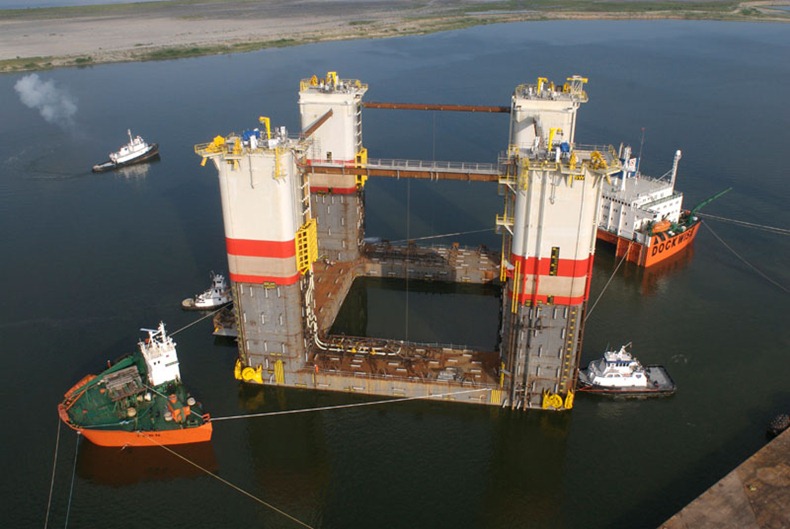When you need to transport large cargo, goods, and materials from one place to another, ship is the ideal choice even though they are extremely slow. Thousands of cargo carriers ply the world's seas and oceans each year, and they handle the bulk of international trade. Then there are heavy lift ships that are designed to carry excessively large loads that even cargo ships cannot bear, such as other ships, drilling rigs or anything else too large or heavy to be easily transported on a conventional ship.
Heavy lift ships are of two types: semi-submerging capable of lifting another ship out of the water and transporting it; and vessels that augment unloading facilities at inadequately equipped ports. Semi-submerging are more commonly known as a "flo/flo" for float-on/float-off. These vessels have a long and low well deck that can go down under water allowing oil platforms, other vessels, or other floating cargo to be moved into position for loading. The tanks are then pumped out, and the well deck rises higher in the water, lifting its cargo, and is ready to sail wherever in the world the cargo needs to be transported.

The flo/flo industry's largest customer base is the oil industry. They have transported many oil drilling rigs from their construction site to the drilling site at roughly three to four times the speed of a self-deploying rig.
In 1988, the heavy lift ship Mighty Servant 2 towed the guided missile frigate USS Samuel B. Roberts, which was nearly sunk by a naval mine in the central Persian Gulf. Eleven years later, MV Blue Marlin transported the U.S. guided missile destroyer USS Cole from Aden, Yemen to Pascagoula, Mississippi, after the warship was damaged in a bombing attack on 12 October 2000.
In 2004, Blue Marlin carried the world's largest semi-submersible oil platform, 60,000 tonne semi-submersible production rig, Thunder Horse, over 15,000 nautical miles from Okpo, Korea to Corpus Christi, Texas.
Many of the larger ships of this class are owned by the company Dockwise, including Mighty Servant 1, MV Blue Marlin, and MV Black Marlin. The company is currently building another heavy weight named the Vanguard that will have 50% greater lifting capacity and 70% greater deck area than the largest heavy lift ship now in service, the Blue Marlin. At 275 meters (902 feet) long and 70 meters (230 feet) wide, the Vanguard can lift 110,000 tonnes and travel across oceans at 14 knots.

Dockwise Swan loading a smaller ship on the deck

Dockwise Tern in the process of loading an oil platform



Dockwise Black Marlin with an oil plaform



MV Blue Marlin goes underwater to prepare for loading.

MV Blue Marlin carrying USS Cole after the warship was damaged in a bombing attack

MV Blue Marlin with an oil platform on its deck



The coastal mine-hunters USS Cardinal (MHC-60) and USS Raven (MHC-61) sit on the deck of MV Blue Marlin after de-ballasting operations, which lifted the mine-hunters onto the MV Blue Marlin’s deck for transport.

The heavy lift vessel MV Blue Marlin with its deck cargo of the Sea-Based X-Band Radar enters Pearl Harbor, Hawaii, after completing a 15,000-mile journey from Corpus Christi, Texas, on January 9, 2006.


MV Mighty Servant 2 carries USS Samuel B. Roberts from Dubai to Newport, R.I., in 1988.

Mighty Servant 3 carrying her last cargo




कोई टिप्पणी नहीं:
एक टिप्पणी भेजें